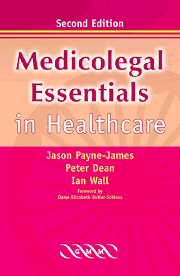Book contents
- Frontmatter
- Contents
- Contributors
- Editors' note for the first edition
- Editors' note for the second edition
- Foreword
- Table of statutes
- Table of cases
- 1 Legal institutions and the legal process
- 2 Human rights and healthcare professionals
- 3 Medical ethics and the forensic physician
- 4 Confidentiality
- 5 Consent to medical treatment
- 6 Professional bodies and discipline
- 7 Complaints in the National Health Service
- 8 The Mental Health Act (England and Wales)
- 9 Death certification and the role of the coroner
- 10 Tissues and organs
- 11 Organ donation
- 12 Living wills
- 13 Euthanasia and end-of-life decision-making
- 14 Abortion and reproductive health
- 15 The Children Act 1989
- 16 Clinical negligence
- 17 Legislation for medicines and product liability
- 18 Clinical trials: ethical, legal and practical considerations
- 19 Medicolegal implications of blood-borne viruses
- 20 Healthcare professionals in court – professional and expert witnesses
- Index
Foreword
Published online by Cambridge University Press: 12 January 2010
- Frontmatter
- Contents
- Contributors
- Editors' note for the first edition
- Editors' note for the second edition
- Foreword
- Table of statutes
- Table of cases
- 1 Legal institutions and the legal process
- 2 Human rights and healthcare professionals
- 3 Medical ethics and the forensic physician
- 4 Confidentiality
- 5 Consent to medical treatment
- 6 Professional bodies and discipline
- 7 Complaints in the National Health Service
- 8 The Mental Health Act (England and Wales)
- 9 Death certification and the role of the coroner
- 10 Tissues and organs
- 11 Organ donation
- 12 Living wills
- 13 Euthanasia and end-of-life decision-making
- 14 Abortion and reproductive health
- 15 The Children Act 1989
- 16 Clinical negligence
- 17 Legislation for medicines and product liability
- 18 Clinical trials: ethical, legal and practical considerations
- 19 Medicolegal implications of blood-borne viruses
- 20 Healthcare professionals in court – professional and expert witnesses
- Index
Summary
In recent years there has been a cultural shift in the perceptions surrounding professional relationships in the area of healthcare. The widespread dissemination of specialist medical information has encouraged patients to adopt a more consumerist role, to question their treatment, and to seek explanations when expected standards are not realised. The provision of medical care has also undergone considerable changes. Means of diagnosis and treatment have multiplied with technological advances, but this has often resulted in an uncomfortable game of catch-up between expectations and outcome. Technology has resulted in the ability of doctors to manipulate life and death and to challenge fundamental notions of the human condition. The focus of medical practice is often on rules of science, and this book looks at medicine from the wider context where rules of custom and law are also important considerations. A vast number of important subject are covered; from controversial issues such as euthanasia, living wills, organ donation and reproductive health, to issues such as consent and confidentiality, which form the very foundation of the doctor/patient relationship. The second edition of this book provides a comprehensive collection of chapters on medicolegal issues, and should be in the bookcase of every health professional, and perhaps every lawyer.
- Type
- Chapter
- Information
- Medicolegal Essentials in Healthcare , pp. xv - xviPublisher: Cambridge University PressPrint publication year: 2004



